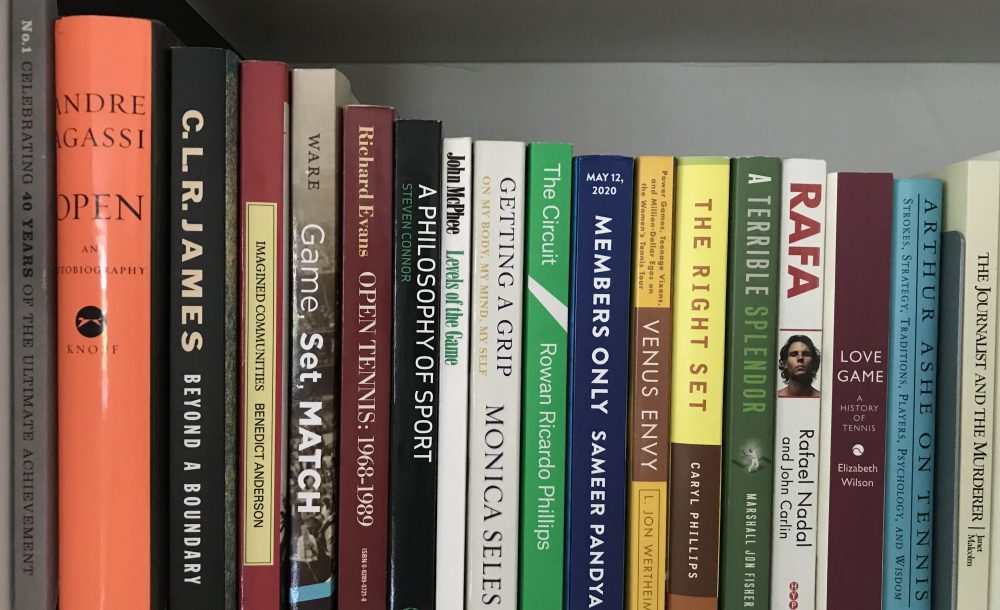
Novak Djoković after winning a mixed doubles match with Ana Ivanović in the 2011 Hopman Cup (Photo credit: Wikipedia).
Preface:
This essay was written over several days last week, in response to a new-media dustup that followed a tweet by Sports Illustrated writer Jon Wertheim: “Have been debating whether to tweet this, but here comes quite an indictment of #djokovic http://tinyurl.com/l46nnbg; happy to link a rebuttal.”
My response to Wertheim began its life as a tweet, grew into a note, and graduated as a long letter, which I sent to him over e-mail. Though there are a variety of reasons I chose him, rather than the blogger, as my primary—my first, if not my most important—interlocutor, I’ll name just one: these issues are contentious enough without making them personal. No individual is responsible for creating the messy political situation that still exists in the Balkans; and no individual is alone in having incomplete, uninformed, &/or problematic views on the subject. To me, this is not a time for the type of debate in which the main goal is to score points—to win—rather than to work, collectively, toward understanding. Neither I nor the original blogger, Jon Wertheim, anyone reading this, or Novak Djoković himself is in a position to single-handedly solve a problem as complex as the conflict over Kosovo’s independence. Together, however, there are a few things we can do—and keep doing. Those include thinking, reading, writing, sharing our views, and engaging in civilized (and, yes, I use that word advisedly) conversation with others.
First and foremost, then, I am interested in dialogue. However, this priority doesn’t mean that I’m not making an argument here. Rather, it’s meant to emphasize my firm belief that there’s a big difference between making an argument and having one. And, to the extent that I am writing to make an argument (and not to have one with either Wertheim or any individual blogger), part of my point is about argument itself. Who’s already guessed that I’m a teacher? Come on, raise your hands. . . Good. I’ll make a point of toasting you the next time I have something other than Earl Grey in my cup.
To give credit where credit is due, I want to acknowledge some of my own teachers. To that end, I’ve scattered a handful of references to true experts on the subjects I discuss here. Also, I should note that my views on writing have taken shape over approximately 30 years of being—alternately and simultaneously—a student and teacher, a reader and writer. One huge influence on my thinking about both writing and the teaching of writing was Greg Colomb, director of the Writing Program at the University of Virginia, who sadly passed away a few months ago. If anyone is looking for a great book on the subject, I would highly recommend his and Joseph Williams’ The Craft of Argument (of which there are several editions).
On the off, off chance that it’s not obvious merely from the number of words here, let me make it so: I take both the form and the content of this argument very seriously. This is not only—or even mostly—because I take myself seriously. Of course, I do that, too: it’s an occupational hazard of being a professor, I’m afraid. (Though I’m also glad to laugh at myself: for instance, at the fact that I haven’t showered or changed out of my bathrobe for three days because I’ve been too busy writing this.) I take what I’m saying here seriously because this is a very, very difficult subject about which to have substantive discussion. Here’s another thing that likely goes without saying: while I certainly don’t expect anyone to read this entire piece or to take it as seriously as I do (other than my family, who loves me!), I hope that anyone who decides to read and comment will keep the sensitivity of the issues we’re discussing in mind.
Given this sensitivity, I want to put the following caveat up front: I am no apologist for a single one of the many horrific crimes committed—by any group—in the former Yugoslavia or the current Republic of Serbia over the past two decades. There is no denying that these things happened and no number of apologies that could undo their damage after the fact (which is not to say that no one should make apologies). Nor, because I am half-Serbian, do I feel any particular need or desire to defend or diminish criminal, unethical, or even morally & politically ambiguous acts by any Serb—any more than I would, because I am a US citizen by birth, defend an act by my own government or a group of Americans which I not only disagreed with but also found destabilizing of my faith in humanity. (If you doubt this, I’d be glad to send you video footage of the fights that took place in my parents’ home during the 1990s. Actually, and perhaps unfortunately for my current purposes, no such documentation exists. But if you’re still uncertain about whether to take my word that plenty of Serbs had and have disagreements on these issues, I invite you to attend a dinner party in virtually any home in the Yugoslav diaspora, to raise the issue in a Belgrade café, or, indeed, to read the article linked at the very end of this missive.) Thus, what follows should by no means be taken as an attempt to defend Novak Djoković from legitimate criticism. Everyone is open to that; nobody is free from the consequences of his or her words or deeds. But not everyone—in fact, not a single Serb—is as clearly in the public eye, and as obvious a target of criticism, as is Djoković. For that reason, and even though I don’t believe for a second that this debate is really about the world’s top-ranked tennis player, I will begin by acknowledging and responding to one of the blogger’s central claims about him.
Continue reading
